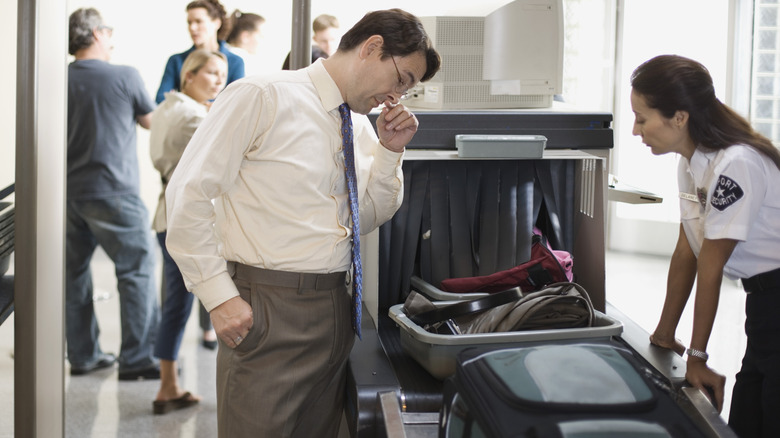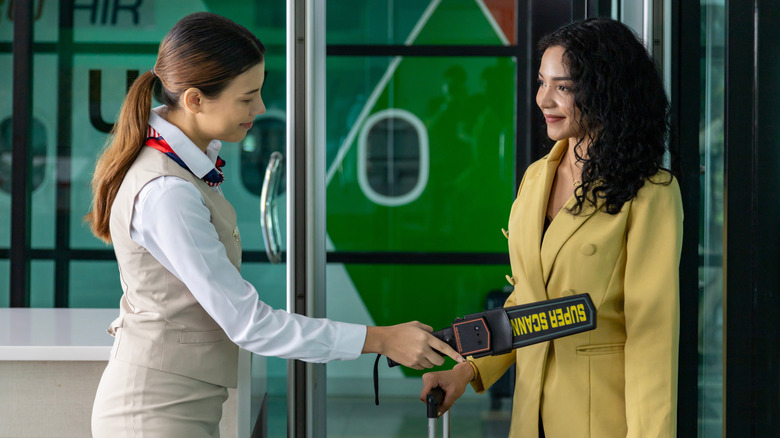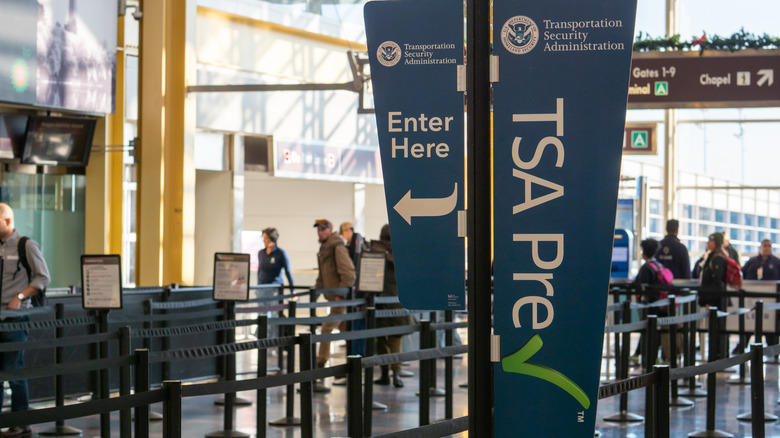The Sneaky Reason TSA Agents Get Chatty With Travelers At Airport Security
In 2023, the Transportation Security Administration (TSA) reported that their agents screened a staggering 858 million passengers at airport security checkpoints. And while the cumbersome process of removing your laptop and shoes for x-raying is the most tedious part of the process for travelers, be careful how you express your frustration, because agents are putting your behavior under a microscope, too. Agents are trained to observe you, and if they see telltale signs that indicate nervousness or deception, they might engage you in conversation — not because they're being friendly, but to gauge your reactions.
TSA is always on the lookout for telltale signs of the kind of nervous energy bad actors are thought to display. There's a checklist they have memorized, listing traits that include sweaty palms, whistling, exaggerated yawning, and even displays of arrogance, especially during the screening process. That last one might be what they're looking for when they ask you whether you're traveling for business or pleasure. Answering, "None of your beeswax!" is likely to get you pulled and frisked, and not just because you're being rude. So instead, be friendly — but not too friendly, because showing too much interest in the security officer is also on the checklist.
TSA's spotty record on behavioral analysis
TSA was established after the September 11, 2001 terrorist attacks, and even though its techniques are constantly evolving, there have been a number of hiccups and critiques of its practices, including its use of behavioral analysis. In 2006, the agency instituted the Screening of Passengers by Observation Techniques (SPOT) program to train a cadre of Behavior Detection Officers to recognize "micro expressions," based on psychologist Paul Ekman's concepts. "Micro expressions are facial expressions that occur within a fraction of a second," Ekman writes on his website. "This involuntary emotional leakage exposes a person's true emotions." Tim Roth played a character based on Ekman in the 2009 television series "Lie to Me," in which a crack behavior analysis team uses micro-expression detection to solve crimes.
But there has been widespread criticism of the practice. In 2015, the American Civil Liberties Union (ACLU) sued TSA for its SPOT program, criticizing its behavior detection practices as "unscientific." They released a report pointing out that the TSA's own documentation failed to support the $1.5 billion program. ACLU also cited studies from the U.S. Government Accountability Office (GAO), including a 2017 report titled "Airport Security: TSA Does Not Have Valid Evidence Supporting Most of the Revised Behavioral Indicators Used in Its Behavior Detection Activities." Reviewing 178 sources TSA cited in support of their screening practices, the GAO concluded that just three of the sources provided scientific evidence, while the rest were news or opinion pieces. As recently as 2020, a peer-reviewed paper in the Yearbook of Legal Psychology criticized TSA for continuing to rely on "pseudoscience" in its behavioral screening practices. Small wonder that more and more travelers have little faith in TSA's ability to protect us.
Navigating ever-changing TSA practices
Behavior analysis isn't the only arena where TSA has struggled. TSA revamped their physical screening procedures after an embarrassing 2015 undercover testing operation found that they failed to detect hidden weapons a whopping 95% of the time. Their success rate has improved since then, and TSA agents intercepted 6,737 firearms at security checkpoints in 2023 — that's 7.8 firearms per million passengers.
If you're a frequent flier and meet TSA's requirements, like being a U.S. citizen and having no criminal record, taking the time to sign up for TSA PreCheck is worthwhile to streamline the process of moving through security. You may still be questioned, but you'll be able to answer with your shoes on and your laptop snug in your backpack. However, in the future, it may not be a beleaguered TSA agent analyzing your micro expressions while chatting you up about where you're going. AI projects are already underway that promise to use technology to analyze voice patterns to identify the very same kinds of emotions Ekman's "micro expressions" do. Whether it will be any more accurate remains to be seen.


